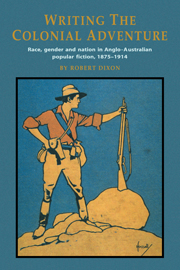 Writing the Colonial Adventure
Writing the Colonial Adventure Book contents
- Frontmatter
- Contents
- List of Illustrations
- Acknowledgements
- Introduction
- 1 The Romance of Property: Rolf Boldrewood and Walter Scott
- 2 Outlaws and Lawmakers: Boldrewood, Praed and the ethics of adventure
- 3 Israel in Egypt: The significance of Australian captivity narratives
- 4 Imperial Romance: King Solomon's Mines and Australian romance
- 5 The New Woman and the Coming Man: Gender and genre in the ‘lost-race’ romance
- 6 The Other World: Rosa Praed's occult fiction
- 7 The Boundaries of Civility: Australia, Asia and the Pacific
- 8 Imagined Invasions: The Lone Hand and narratives of Asiatic invasion
- 9 The Colonial City: Crime fiction and empire
- 10 Beyond Adventure: Louis Becke
- Conclusion
- Notes
- Select Bibliography
- Index
3 - Israel in Egypt: The significance of Australian captivity narratives
Published online by Cambridge University Press: 05 November 2011
- Frontmatter
- Contents
- List of Illustrations
- Acknowledgements
- Introduction
- 1 The Romance of Property: Rolf Boldrewood and Walter Scott
- 2 Outlaws and Lawmakers: Boldrewood, Praed and the ethics of adventure
- 3 Israel in Egypt: The significance of Australian captivity narratives
- 4 Imperial Romance: King Solomon's Mines and Australian romance
- 5 The New Woman and the Coming Man: Gender and genre in the ‘lost-race’ romance
- 6 The Other World: Rosa Praed's occult fiction
- 7 The Boundaries of Civility: Australia, Asia and the Pacific
- 8 Imagined Invasions: The Lone Hand and narratives of Asiatic invasion
- 9 The Colonial City: Crime fiction and empire
- 10 Beyond Adventure: Louis Becke
- Conclusion
- Notes
- Select Bibliography
- Index
Summary
The significance of captivity narratives in American literature and popular culture has long been recognised, and is the subject of numerous books and scholarly articles. The principal study of their genesis in American literature is Richard Slotkin's monumental Regeneration Through Violence (1973). Slotkin was interested in the way archetypal narrative forms emerge under determinate circumstances in a nation's history to be incorporated into its art and literature. His definition of the American archetype as it emerged in the late seventeenth century is worth quoting at some length:
In it a single individual, usually a woman, stands passively under the strokes of evil, awaiting rescue by the grace of God. The sufferer represents the whole, chastened body of Puritan society, and the temporary bondage of the captive to the Indian is a dual paradigm – of the bondage of the soul to the flesh and to the temptations arising from original sin, and of the self-exile of the English Israel from England. In the Indian's devilish clutches, the captive had to meet and reject the temptation of Indian marriage and/or the Indian's ‘cannibal’ Eucharist. To partake of the Indian's love or his equivalent of bread and wine was to debase, to un-English the very soul. The captive's ultimate redemption by the grace of Christ and the efforts of the Puritan magistrates is likened to the regeneration of the soul in conversion. […]
- Type
- Chapter
- Information
- Writing the Colonial AdventureRace, Gender and Nation in Anglo-Australian Popular Fiction, 1875–1914, pp. 45 - 61Publisher: Cambridge University PressPrint publication year: 1995


